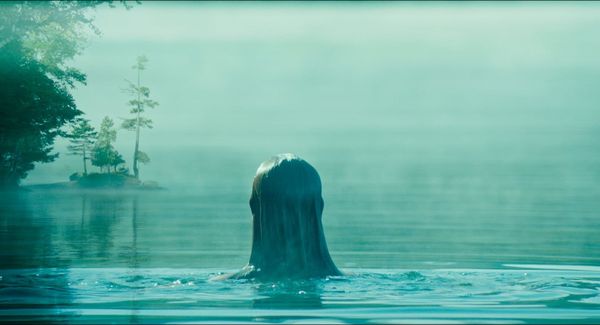Eye For Film >> Movies >> Song Of Sway Lake (2017) Film Review
Song Of Sway Lake
Reviewed by: Jennie Kermode

Over and over, people jump into Lake Sway. We see them in the present day, giggling teenagers with jet skis. We see them in clips of old film, infomercials for this once fashionable holiday destination. It's different for Ollie's father. When he jumps in it's winter, the lake is covered in ice, and he's fully clothed. He doesn't intend to resurface.
Ollie's father was a record collector. It's something he's passed down to his son, along with the philosophy that this work is about preserving the dead, preserving art and beauty so that it can live on. What he has not passed down is his original pressing of the song that made the lake famous. This valuable record is in the possession of Ollie's grandmother Charlie, and the boy wants it, so one summer he goes up to the lake, best friend Nikolai in tow, with the intention of stealing it.

Melodies like this find magic in the familiar. Song Of Sway Lake is a film built around American archetypes. The two young thieves, bold and brash. A remembered husband, dashing and romantic. An elegant woman who once danced like Daisy Fay and still, decades later, possesses that je ne sais quoi, that ineffable mystery towards which Hollywood strives and which, in the absence of any deep history, much white American culture is built around. Eschewing his own richer history, Nikolai longs to connect with this American vision, and to Ollie's dismay, when Charlie unexpectedly arrives at the house, the young Russian proves to be as fascinated by her as by their original daring escapade.
There is much here of the nostalgia for a vanished age captured in Woody Allen's Midnight In Paris - that sense of longing for something one has never actually known and understands only through its relics, filtering out the difficult parts. It's an illusion, of course, and for all that she's charmed by Nikolai's attentions, Charlie is wise enough to know it. The illusions on which her own glamour is based are revealed through her complex relationship with her maid. There's an undeniable bond between them, but a casual remark over dinner about how she and her husband acquired her, "and we tried really hard to get her children here too," reveals an unconsidered cruelty and the darker side of the Jazz Age, a landscape of prejudice and loneliness behind all that dazzling privilege.
To Ollie, the situation seems much simpler. He's comfortable with stealing what he feels is rightfully his anyway. He's not comfortable with seeing his friend seduce a lonely woman three times his age and, he assumes, going on to break her heart. He's also jealous of the easy way in which Nikolai adopts the mantle of an elite to which he does not belong, something which gradually reveals his own relationship to class, in defiance of his hippy drifter aesthetic. The awkwardness of this role is effectively drawn out by Rory Culkin, making the journey from child star to serious actor with unusual grace. On the one hand he's sidelined by the romantic dynamic; on the other, his is the most complex character and the one on whom the film depends for its spell to be maintained. He combines moral discomfort and unwillingness to take action with noteable skill.
Robert Sheehan brings energy and flair to the role of Nikolai, maintaining that all important ambiguity right up until the end and showing just enough vulnerability to help us understand what's at stake. It's Mary Beth Peil, however, who dominates the film as Charlie, bringing dignity, humanity and sheer force of personality to what could all too easily have been a one note character. Her charisma is essential to showing us why a young man who might be developing his own theme is caught up in the coda of a composition whose intricacies elude him. In the end, the lake is Charlie's, the film is Charlie's, and it's worth making a song and dance about.
Reviewed on: 24 Jun 2017














